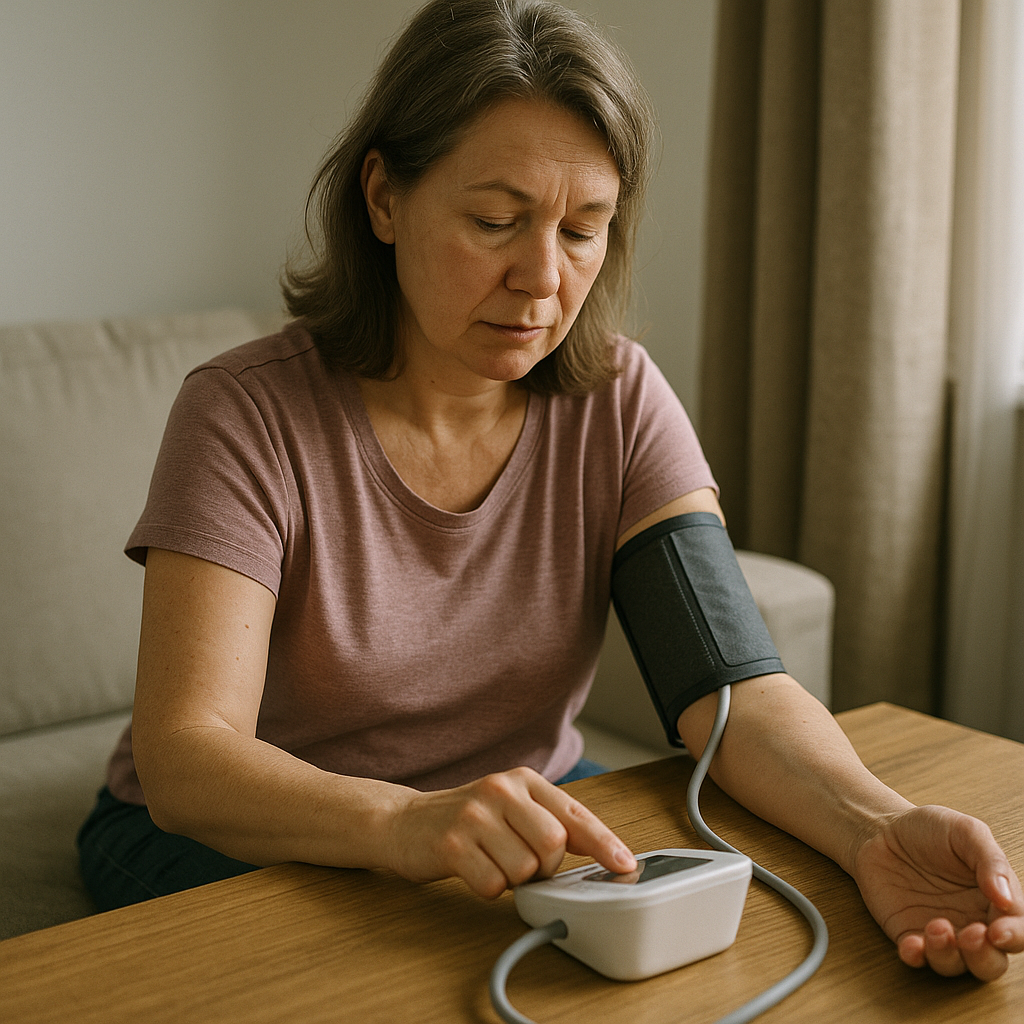Ask Ayurvedic doctor a question and get a consultation online on the problem of your concern in a free or paid mode. More than 2,000 experienced doctors work and wait for your questions on our site and help users to solve their health problems every day.
High BP Symptoms: Early Warning Signs and Ayurvedic Solutions

High blood pressure, or hypertension, is one of those sneaky health issues that often goes unnoticed until it causes real damage. Many people walk around every day with high bp symptoms and don’t even realize it. That’s because symptoms of high blood pressure can be subtle, or mistaken for stress, fatigue, or even just “normal aging.” Recognizing bp high symptoms early can make a huge difference — sometimes even save your life. So this article isn’t just about listing symptoms, but also exploring Ayurvedic insights and practical ways to control high BP naturally.
We’ll look at how blood pressure works, what’s considered high bp range versus a normal bp range, and how to listen to your body’s signals. Plus, we’ll dig into Ayurveda’s take on hypertension symptoms, and how lifestyle, diet, and herbs can make a huge impact — sometimes more than meds alone.

What Is High Blood Pressure and How Is It Measured?
Blood pressure is basically the force your blood exerts against your artery walls. When it stays too high for too long, your heart and blood vessels start to suffer. That’s hypertension.
BP is measured using two numbers: systolic (the top number) and diastolic (the bottom). For example, a reading of 120/80 mmHg is considered healthy.
High BP Range vs. Normal BP Range
So, what’s “normal” and what’s “high”? Here’s a quick breakdown:
-
Normal BP range: Less than 120/80 mmHg
-
Elevated: 120-129/<80 mmHg
-
Stage 1 Hypertension: 130-139/80-89 mmHg
-
Stage 2 Hypertension: 140+/90+ mmHg
-
Hypertensive crisis: 180+/120+ mmHg — get help immediately
If your numbers are creeping up, it’s time to pay attention. Waiting until you’re in the “danger zone” isn’t a smart move — some damage can’t be undone.
What Causes Hypertension
The list is long, and unfortunately, many causes are lifestyle-related. Common culprits include:
-
High salt intake
-
Stress (yep, it’s a biggie)
-
Poor sleep or too little rest
-
Lack of physical activity
-
Obesity or being overweight
-
Genetics
-
Smoking and alcohol
Sometimes there’s no clear cause — that’s called essential hypertension, and it’s the most common type.

Don't wait or self medicate. Start chat with Doctor NOW
High BP Symptoms You Shouldn’t Ignore
Common Symptoms of High Blood Pressure in Daily Life
Most people think high BP has obvious signs. But it often doesn’t. That’s why it’s dubbed the “silent killer.” Still, here are some high blood pressure symptoms you might notice:
-
Frequent headaches, especially in the morning
-
Dizziness or lightheadedness
-
Blurry vision or double vision
-
Shortness of breath after mild activity
-
Nosebleeds that seem random
-
Fatigue that doesn’t improve with rest
-
Heart palpitations or irregular heartbeat
If these pop up often, don’t brush 'em off. Even if they seem mild, they could point to something more serious going on under the surface.
Less-Known Hypertension Symptoms
Then there are the weird ones — the hypertension symptoms nobody talks about:
-
Ringing in the ears (tinnitus)
-
Chest discomfort not related to digestion
-
Irritability or mood swings
-
Difficulty concentrating or "brain fog"
-
Sudden sweating without exertion
-
Swelling in the ankles or feet
These are less common but still worth paying attention to. Especially if you’re in the high BP range, even if you “feel fine.”

Ayurvedic View on BP High Symptoms and Imbalances
Pitta Imbalance and Hypertension in Ayurveda
In Ayurveda, hypertension isn’t just about numbers — it’s about dosha imbalances, especially Pitta. Pitta governs fire and heat in the body. When Pitta is out of whack, it can lead to overheating, irritability, inflammation, and yes — high blood pressure.
People with a dominant Pitta constitution (those who are intense, focused, and quick to anger or get frustrated) are more prone to hypertension. But it’s not just about your body type — your lifestyle, stress levels, and diet play a massive role in tipping the scales.
According to Ayurvedic texts, high bp symptoms often reflect Pitta-related issues like:
-
Hot flashes or heat sensitivity
-
Redness in the face or eyes
-
Excessive thirst
-
Anger or irritability
-
Intense headaches
This isn’t to say other doshas aren’t involved. Kapha imbalances can lead to sluggish circulation and weight gain, while Vata imbalances might cause anxiety and irregular heartbeats — all of which can feed into high blood pressure symptoms.
Signs of Excess Heat, Stress, and Aggravated Doshas
Ayurveda connects bp high symptoms to an overloaded system — too much stress, poor digestion (ama), and disturbed mental balance. Some subtle signs your doshas may be out of balance:
-
You wake up tired, even after a full night of sleep
-
You’re quick to react, emotionally or physically
-
Food sits in your stomach like a rock
-
You feel “wired but tired” — constantly alert but exhausted
These are red flags. While they may not scream symptoms of high blood pressure, they point to deeper disharmony that can eventually manifest as hypertension.

How to Control High BP Naturally and Effectively
Alright, so you know the signs and understand how Ayurveda views the issue — now let’s talk solutions. You can learn how to control high BP naturally, and for many, these methods are just as effective as medication (if not more, long term).
Daily Routine, Diet, and Herbs for Hypertension Relief
Start with a calming daily routine. Ayurveda calls it Dinacharya — basically, keeping a rhythm that grounds your mind and body. Here are a few foundational practices:
-
Wake up before sunrise (yes, it’s hard, but it helps)
-
Drink warm water with a few drops of lemon
-
Practice pranayama (breathwork) to calm your nervous system
-
Avoid excessive screen time in the evening
-
Sleep by 10 PM — your adrenals will thank you
Diet is equally key. Ditch spicy, fried, and heavy foods. Go for cooling, hydrating options — think cucumber, coriander, amla, and coconut water.
And herbs? Oh yes. Some Ayurvedic stars for hypertension include:
-
Arjuna – improves cardiac function
-
Ashwagandha – reduces stress and balances cortisol
-
Brahmi – calms the mind and supports brain health
-
Sarpagandha – historically used for high BP medicine, though it's quite potent and should be used under supervision
Also, don't underestimate basic things like walking barefoot on grass or oil massage (abhyanga). These calm the body and help restore balance.
High BP Medicine in Ayurveda vs. Allopathic Options
Now, this part gets tricky. Modern high BP medicine — like ACE inhibitors, beta blockers, or diuretics — can be effective, especially in acute or advanced cases. But they don’t always solve the root cause. They manage, they don’t heal.
Ayurveda aims to eliminate the root imbalance, not just bring the numbers down. That said, don't throw away your meds just yet. Many people use both systems together — a balanced approach that respects urgency but works toward long-term wellness.
And hey — always consult your doctor or a qualified Ayurvedic practitioner before making big changes. Self-medicating, whether with herbs or pills, can backfire.
Conclusion
High blood pressure isn't just a number on a machine — it’s your body whispering (or sometimes shouting) that something’s out of balance. Whether it’s a pounding headache in the morning, random mood swings, or a racing heart while sitting still, these high bp symptoms are your signal to slow down and listen.
We’ve covered how hypertension symptoms can show up in daily life, and how Ayurveda views them not as isolated issues, but as reflections of deeper imbalances — whether it’s aggravated Pitta, emotional stress, poor sleep, or just being out of sync with your natural rhythm. Understanding the high bp range and what’s considered a normal bp range helps, but it’s only part of the picture.
The truth? You don’t have to wait until you’re in a “danger zone” to take action. Start small — change your morning habits, switch out one unhealthy food a day, try calming breathwork, or sip on an herbal tea instead of your third coffee. Over time, these small shifts add up. And they may be the key to not needing high BP medicine in the first place (or at least, less of it).
Your body wants to heal — it’s wired for balance. You just have to give it the tools.
Take the Next Step
If you or someone you care about has been brushing off bp high symptoms, now’s the time to take them seriously. Catching symptoms of high blood pressure early can prevent long-term damage — not just to your heart, but to your brain, kidneys, and even your eyes.
Start with a few Ayurvedic changes today. Revisit your daily routine. Try adding in calming herbs like Brahmi or Ashwagandha. And if you’re already on high bp medicine, great — but think of it as step one, not the whole journey.
💬 Have questions? Share your thoughts below or pass this article along to a friend who might need it. You could be saving a life (yep, really).
✨ Remember: Your health isn’t just numbers. It’s a daily relationship with your body. Make it a loving one.
FAQs
What is the danger zone for high blood pressure?
The danger zone usually refers to a BP reading of 180/120 mmHg or higher. This is known as a hypertensive crisis and needs immediate medical attention. Symptoms at this level might include severe headaches, vision problems, chest pain, or confusion — don’t wait it out, get help fast.
Does high BP cause gas?
Strangely enough, yes — sometimes. High blood pressure symptoms can overlap with digestive discomfort. Stress (which raises BP) can also mess with gut function, leading to bloating or gas. Plus, some high bp medicine may have gastrointestinal side effects. If it’s persistent, talk to your doc or an Ayurvedic expert.
What to eat when BP is high?
Focus on foods that are cooling, hydrating, and low in sodium. Great choices include:
-
Steamed veggies (especially beets, carrots, and gourds)
-
Fresh fruits like pomegranate, apple, and berries
-
Coriander and cumin-infused water
-
Flaxseeds and chia for Omega-3s
-
Garlic, ginger, and turmeric (in moderation)
Avoid fried, spicy, or overly salty dishes. And stay away from caffeine overload, which can spike your BP.
How long does it take to control BP with natural methods?
That really depends. Some people notice a difference in 1 to 2 weeks, especially if their hypertension is mild and stress-related. For others, it might take a few months of consistent effort with diet, herbs, and lifestyle shifts. Keep in mind that consistency is key. Natural methods aren't overnight miracles, but they do work with time and patience.

